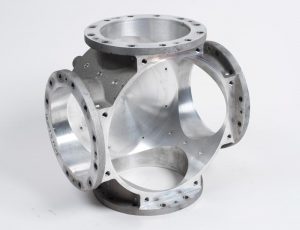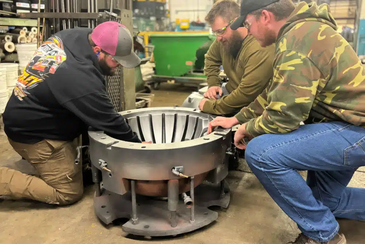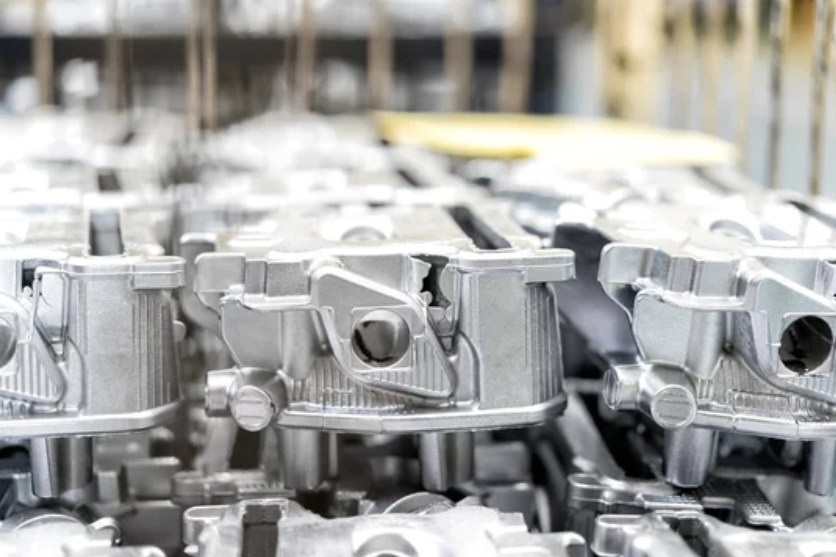The Role of Aluminum Foundries ahead of time Lightweight Manufacturing Solutions
Light weight aluminum shops significantly add to the evolution of light-weight manufacturing remedies. Their innovative casting innovations yield high-strength, light-weight components crucial for industries such as vehicle and aerospace. This innovation not just boosts item performance however likewise advertises sustainability with using recycled materials. As these foundries adapt to arising technologies and practices, they lead the way for future growths in producing performance and environmental duty. What lies in advance in this transformative journey?
The Advantages of Lightweight Products in Production
As sectors progressively seek effectiveness and sustainability, the adoption of light-weight products in manufacturing has arised as a crucial approach - Aluminum Foundry. These products, specifically aluminum and composites, offer countless advantages that enhance manufacturing procedures and item efficiency. Primarily, their lowered weight adds to lower power intake during transportation and procedure, resulting in substantial price savings
Moreover, light-weight materials help with the design of even more facility geometries, enabling better innovation in product advancement. This flexibility often causes improved performance and performance, catering to the progressing demands of modern-day consumers.
Furthermore, using light-weight materials can improve the long life of items as a result of their resistance to rust and tiredness. This toughness not only minimizes upkeep prices yet additionally supports sustainability initiatives, as longer-lasting products add to much less waste. To summarize, the benefits of lightweight products are essential in driving performance, advancement, and ecological duty in manufacturing.
Technologies in Light Weight Aluminum Casting Technologies
Recent improvements in light weight aluminum spreading technologies are reinventing the production landscape, specifically in the manufacturing of lightweight elements. Developments such as high-pressure die spreading and vacuum cleaner die casting have actually considerably improved the precision and surface area coating of light weight aluminum parts - Aluminum Foundry. These approaches enable the creation of complicated geometries while lessening material waste and improving mechanical residential properties

Furthermore, the execution of real-time tracking systems assures quality assurance throughout the casting procedure, bring about even more consistent product end results. Collectively, these advancements not just enhance the efficiency of aluminum components yet likewise support the sector's change towards more sustainable production practices.
Applications of Light Weight Aluminum Elements in Numerous Industries
While aluminum parts have actually long been made use of in various markets, their flexibility and lightweight buildings proceed to drive ingenious applications throughout industries such as vehicle, aerospace, and building and construction. In the automotive market, light weight aluminum is progressively utilized for engine blocks, wheels, and body panels, boosting gas efficiency and performance. Aerospace manufacturers leverage aluminum for aircraft frameworks and parts, profiting from its strength-to-weight proportion to boost gas economic climate and haul ability.
In the building market, light weight aluminum is favored for home window structures, roof, and structural aspects, giving durability and resistance to corrosion while lowering total structure weight. Furthermore, the electrical and electronic devices markets gain from light weight aluminum's conductivity and light-weight nature, utilizing it in electrical wiring, enclosures, and warmth sinks. These diverse applications highlight the essential role of light weight aluminum parts, which not only fulfill sector needs but also add to innovations in product layout and capability across multiple areas.
Sustainability and Energy Performance in Aluminum Foundries
The light weight aluminum foundry market plays a crucial duty in advertising sustainability and energy efficiency, especially Check Out Your URL as demand for lightweight elements continues to expand across different markets. Foundries are progressively adopting ecologically pleasant practices, such as utilizing recycled light weight aluminum, which considerably reduces power consumption and greenhouse gas discharges compared to main aluminum manufacturing.
Furthermore, advancements in casting technologies boost energy efficiency by maximizing the melting processes and lowering waste. Methods like die casting and financial investment casting permit precise product use, lessening excess and scrap.
In addition, numerous shops are investing in renewable power resources to power procedures, even more reducing their carbon footprint. Carrying out energy monitoring systems enables factories to boost and monitor energy use, ensuring they operate at peak efficiency.

Future Trends in Lightweight Production Solutions
Exactly how will arising innovations shape the future of light-weight production remedies? Innovations such as innovative products, automation, and additive production are readied to redefine production procedures. The integration of smart manufacturing technologies, including the Net of Points (IoT) and expert system (AI), will make it possible for real-time surveillance and optimization, improving effectiveness and minimizing waste.

As sustainability remains to check my source be a critical concern, lightweight options will significantly focus on reusing and recycling products, straightening with circular economic climate concepts. This evolution in lightweight manufacturing will certainly not just boost item efficiency yet likewise add to ecological objectives, making certain that the market stays affordable in a swiftly transforming market landscape.
Regularly Asked Inquiries
Exactly How Do Light Weight Aluminum Foundries Make Certain Top Quality Control in Manufacturing?
Aluminum shops assure top quality control in production through extensive testing, standard treatments, and constant tracking - Precision aluminum casting. They apply advanced technologies and proficient personnel to keep consistency, decrease issues, and fulfill industry requirements throughout the production procedure
What Are the Main Tests Encountered by Light Weight Aluminum Foundries?
Light weight aluminum factories encounter challenges such as fluctuating raw product expenses, preserving manufacturing performance, guaranteeing constant quality, adapting to technical developments, and conference ecological policies, every one of which effect their general functional performance and competitiveness out there.
How Does Aluminum Recycling Effect Factory Procedures?
Light weight aluminum reusing considerably boosts foundry operations by lowering raw material costs, lessening power intake, and lowering environmental effect. This sustainable method allows foundries to enhance effectiveness while fulfilling raising need for light-weight, high-performance aluminum products.
What Abilities Are Required for Employees in Aluminum Foundries?
Workers in light weight aluminum factories require skills in metallurgy, machining, quality assurance, and safety practices. Proficiency in operating equipment, recognizing alloy residential properties, and analytical are additionally vital for efficient manufacturing and preserving high safety and security standards.
How Do Aluminum Foundries Deal With Waste Administration?
Light weight aluminum foundries take care of waste with reusing scrap metal, using effective waste segregation next page methods, and sticking to ecological guidelines. They carry out sustainable practices to minimize land fill contributions, ensuring that unsafe materials are gotten rid of responsibly.
Light weight aluminum factories considerably contribute to the advancement of lightweight manufacturing solutions. Current advancements in aluminum casting innovations are revolutionizing the production landscape, especially in the production of light-weight elements. While aluminum elements have actually long been made use of in numerous sectors, their convenience and lightweight buildings proceed to drive ingenious applications throughout industries such as vehicle, aerospace, and construction. In addition, the electric and electronics markets profit from light weight aluminum's conductivity and lightweight nature, utilizing it in wiring, enclosures, and warmth sinks. The light weight aluminum foundry market plays a critical role in advertising sustainability and power efficiency, especially as need for lightweight parts proceeds to grow across different sectors.